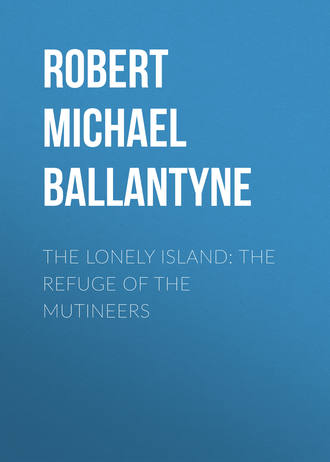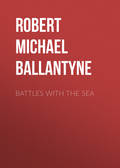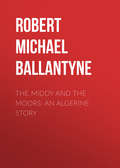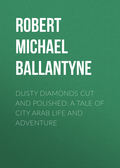
Robert Michael Ballantyne
The Lonely Island: The Refuge of the Mutineers
Chapter Twenty Seven
A Picnic and a Surprise
But the cyclone, terrible though it was, did not altogether put an end to the Dumplin’ picnic, if we may be allowed the phrase. It only delayed it. As soon as the weather cleared up, that interesting event came off.
“Who’ll go by land and who’ll go by water?” asked Thursday, when the heads of houses were assembled in consultation on the morning of the great day, for great it was in more ways than one in the annals of Pitcairn.
“I’ll go by water,” said Charlie Christian, who was one of the “heads,” inasmuch as he had been appointed to take charge of the hut which had been nearly carried away.
“Does any one know how the girls are going?” asked Matt Quintal.
“I’m not sure,” said John Adams, with one of those significant glances for which he was noted. “I did hear say that Sally meant to go by land, but, of course, I can’t tell. Girls will be girls, you know, an’ there’s no knowing when you have them.”
“Well, perhaps the land road will be pleasanter,” said Charlie. “Yes, now I think of it, I’ll go by land.”
“I think, also,” continued Adams, without noticing Charlie’s remark, “that some one said Bessy Mills was going by water.”
“You’re all wrong, Charlie, about the land road,” said Matt Quintal; “the water is far better. I shall go by water.”
“Dan’l, my lad,” said Adams, addressing young McCoy, “which way did you say you’d go?”
“I didn’t say I’d go any way, father,” answered Dan.
“That may be so, lad, but you’ll have to go one way or other.”
“Not of necessity, father. Mightn’t I stay at home and take care of the pigs?”
“You might,” said Adams, with a smile, “if you think they would be suitable company for you. Well, now, the sooner we start the better. I mean to go by water myself, for I’m gettin’ rather stiff in the legs for cliff-work. Besides, I promised to give Sarah Quintal a lesson in deep-sea fishing, so she’s goin’ with me.”
“Perhaps,” observed Dan McCoy, after a pause, “I might as well go by water too, and if you’ve no objection to take me in your canoe, I would lend you a hand wi’ the paddle. I would be suitable company for you, father, you know, and I’m very anxious to improve in deep-sea fishin’.”
“It don’t take much fishin’ to find out how the wind blows, you blessed innocents,” thought John Adams, with a quiet chuckle, which somewhat disconcerted Dan; but he only said aloud, “Well, yes, you may come, but only on condition that you swim alongside, for I mean to carry a cargo of staggerers and sprawlers.”
“There’s only one staggerer and one sprawler now,” said Dan, with a laugh; “your own George and Toc’s Dumplin’.”
“Just so, but ain’t these a host in themselves? You keep your tongue under hatches, Dan, or I’ll have to lash it to your jaw with a bit o’ rope-yarn.”
“Oh, what a yarn I’d spin with it if you did!” retorted the incorrigible Dan. “But how are the jumpers to go, and where are they?”
“They may go as they please,” returned Adams, as he led the way to the footpath down the cliffs; “they went to help the women wi’ the victuals, an’ I’ve no doubt are at their favourite game of slidin’ on the waves.”
He was right in this conjecture. While the younger women and girls of the village were busy carrying the provisions to the beach, those active little members of the community who were styled jumpers, and of whom there were still half-a-dozen, were engaged in their favourite game. It was conducted amid shouts and screams of delight, which rose above the thunder of the mighty waves that rolled in grand procession into the bay.
Ned Quintal, the stoutest and most daring, as well as the oldest of these jumpers, being over eight years, was the best slider. He was on the point of dashing into the sea when Adams and the others arrived on the scene.
Clothed only with a little piece of tapa cloth formed into breeches reaching to about the knees, his muscular little frame was shown to full advantage, as he stood with streaming curly hair, having a thin board under his arm, about three feet long, and shaped like a canoe.
He watched a mighty wave which was coming majestically towards him. Just as it was on the point of falling, little Ned held up the board in front of him, and with one vigorous leap dived right through the wave, and came out at the other side. Thus he escaped being carried by it to the shore, and swam over the rolling backs of the waves that followed it until he got out to sea. Then, turning his face landward, he laid his board on the water, and pushing it under himself, came slowly in, watching for a larger wave than usual. As he moved along, little Billy Young ranged alongside.
“Here’s a big un, Billy,” cried Ned, panting with excitement and exertion, as he looked eagerly over his shoulder at a billow which seemed big enough to have wrecked an East Indiaman.
Billy did not reply, for, having a spice of Dan McCoy’s fun-loving spirit in him, he was intent on giving Ned’s board a tip and turning it over.
As the wave came up under them, it began as it were to boil on the surface, a sure sign that it was about to break. With a shout Ned thrust his board along, and actually mounted it in a sitting posture. Billy made a violent kick, missed his aim, lost hold of his own board, and was left ignominiously behind. Ned, caught on the wave’s crest, was carried with a terrific rush towards the shore. He retained his position for a few seconds, then tumbled over in the tumult of water, but got the board under him again as he was swept along.
How that boy escaped being dashed to pieces on the rocks which studded Bounty Bay is more than we can comprehend, much more, therefore, than we can describe. Suffice it to say, that he arrived, somehow, on his legs, and was turning to repeat the manoeuvre, when Adams called to him and all the others to come ashore an’ get their sailin’ orders.
Things having been finally arranged, Adams said, “By the way, who’s stopping to take charge of poor Jimmy Young?”
A sympathetic look from every one and a sudden cessation of merriment followed the question, for poor little James Young, the only invalid on Pitcairn, was afflicted with a complaint somewhat resembling that which carried off his father.
“Of course,” continued Adams, “I know that my old ’ooman an’ Mainmast are with him, but I mean who of the young folk?”
“May Christian,” said Sally, who had come down to see the water-party start. “Two or three of us offered also to stay, father, but Jim wouldn’t hear of it, an’ said he would cry all the time if we stayed. He said that May was all he wanted.”
“Dear little Jim,” said Adams, “I do believe he’s got more o’ God’s book into him, small though he is, than all the rest of us put together. An’ he’s not far wrong, neither, about May. She’s worth a dozen or’nary girls. Now then, lend a hand wi’ the canoe. Are you ready, Mistress Toc?”
“Quite,” replied the heroine of the day, with a pleased glance in Thursday’s somewhat sheepish face.
“An’ Dumplin’, is he ready?” said the seaman.
The hero of the day was held up in the arms of his proud father.
“Now then, lads, shove off!”
In a few minutes the canoe, with its precious freight and Thursday at the steering-paddle, was thrust through the wild surf, and went skimming over the smooth sea beyond. Immediately thereafter another canoe was launched, with John Adams and a miscellaneous cargo of children, women, and girls, including graceful Bessy Mills and pretty Sarah Quintal.
“Now then, here goes,” cried Matt Quintal, wading deep into the surf. “Are you coming, Dan?”
“I’m your man,” said Dan, following.
Both youths raised their hands and leaped together. They went through the first wave like two stalwart eels, and were soon speeding after the canoes, spurning the water behind them, and conversing as comfortably on the voyage as though the sea were their native element.
Close on their heels went two of the most athletic among the smaller boys, while one bold infant was arrested in a reckless attempt to follow by Otaheitan Sally, who had to rush into the surf after him.
Descended though he was of an amiable race, it is highly probable that this infant would have displayed the presence of white blood in his veins had his detainer been any other than Sally; but she possessed a power to charm the wildest spirit on the island. So the child consented to “be good,” and go along with her overland.
“Now, are you ready to go?” said Sally to Charlie, who was the only other one of the band left on the beach besides herself.
Poor Charlie stood looking innocently into the sparkling face of the brunette. He did not know what was the matter with him, still less did he care. He knew that he was supremely happy. That was enough. Sally, who knew quite well what was the matter—quite as well, almost, as if she had gone through a regular civilised education—laughed heartily, grasped the infant’s fat paw, and led him up the hill.
Truly it was a pleasant picnic these people had that day. Healthy and hearty, they probably came as near to the realisation of heaven upon earth as it is ever given to poor sinful man to know, for they had love in their hearts, and their religion, drawn direct from the pure fountain-head, was neither dimmed by false sentimentality on the one hand, nor by hypocrisy on the other.
Perhaps John Adams was the only one of the band who wondered at the sight, and thanked God for undeserved and unexpected mercy, for he alone fully understood the polluted stock from which they had all sprung, and the terrible pit of heathenish wickedness from which they had been rescued, not by him (the humbled mutineer had long since escaped from that delusion), but by the Word of God.
After proceeding a considerable distance along the rocky coast of their little isle, John Adams ordered the canoes to lie-to, while he made an attempt to catch a fresh cod for dinner.
Of course, Matt Quintal and Dan McCoy ranged up alongside, and were speedily joined by some of the adventurous small boys. Adams took these latter into the canoe, but the former he ordered away.
“No, no,” he said, while Sarah Quintal assisted to get out the bait and Bessy Mills to arrange the line. “No, no, we don’t want no idlers here. You be off to the rocks, Matt and Dan, an’ see what you can catch. Remember, he who won’t work shall not eat. There should be lots o’ crawfish about, or you might try for a red-snapper. Now, be off, both of you.”
“Ay, ay, father,” replied the youths, pushing off and swimming shoreward rather unwillingly.
“I don’t feel much inclined to go after crawfish or red-snappers to-day, Matt, do you?” asked Dan, brushing the curls out of his eyes with his right hand.
“No, not I; but we’re bound to do something towards the dinner, you know.”
At that moment there was a loud shouting and screaming from the canoe. They looked quickly back. Adams was evidently struggling with something in the water.
“He has hooked something big,” cried Matt; “let’s go see.”
Dan said nothing, but turned and made for the canoe with the speed of a porpoise. His companion followed.
Adams had indeed hooked a large cod, or something like it, and had hauled it near to the surface when the youths came up.
“Have a care. He bolts about like a mad cracker,” cried Adams. “There, I have him now. Stand clear all!”
Gently did the seaman raise the big fish to the surface, and very tenderly did he play him, on observing that he was not well hooked.
“Come along, my beauty! What a wopper! Won’t he go down without sauce? Pity I’ve got no kleek to gaff him. Not quite so close, Dan, he’ll get—Hah!”
The weight of the fish tore it from the hook at that moment, and it dropped.
Dropped, ay, but not exactly into its native element. It dropped into Dan’s bosom! With a convulsive grasp Dan embraced it in his strong arms and sank. Matt Quintal dived, also caught hold of the fish with both hands and worked his two thumbs deep into its gills. By the process called treading water, the two soon regained the surface. Sarah Quintal seized Dan McCoy by the hair, Bessy Mills made a grasp at Matt and caught him by the ear, while John Adams made a grab at the fish, got him by the nose, thrust a hand into his mouth, which was wide open with surprise or something else, as well it might be, and caught it by the tongue.
Another moment, and a wild cheer from the boys announced that the fish was safe in the canoe.
“We’re entitled to dinner now, father,” said Dan, laughing.
“Not a bit of it, you lazy boys; that fish is only big enough for the girls. We want something for the men and child’n. Be off again.”
With much more readiness the youths, now gratified by their success, turned to the outlying rocks of a low promontory which jutted from the inaccessible cliffs at that part. Effecting a landing with some difficulty, they proceeded to look for crawfish, a species of lobster which abounds there.
Leaning over a ledge of rock, and peering keenly down into a clear pool which was sheltered from the surf, Dan suddenly exclaimed, “There’s one, Matt; I see his feelers.”
As he spoke he dived into the water and disappeared. Even a pearl diver might have wondered at the length of time he remained below. Presently he reappeared, puffing like a grampus, and holding a huge lobster-like creature in his hands.
“That’ll stop the mouths of two or three of us, Matt!” he exclaimed, looking round.
But Matt Quintal was nowhere to be seen. He, too, had seen a fish, and gone to beard the lobster in his den. In a few seconds he reappeared with another crawfish.
Thus, in the course of a short time, these youths captured four fine fish, and returned to the canoe, swimming on their backs, with one in each hand.
While things were progressing thus favourably at sea, matters were being conducted not less admirably, though with less noise, on land.
The canoe containing Mrs Toc and the celebrated baby went direct to the landing-place at Martin’s Cove, which was a mere spot of sand in a narrow creek, where landing was by no means easy even for these expert canoemen.
Here the women kindled a fire and heated the culinary stones, while Toc and some of the others clambered up the cliffs to obtain gulls’ eggs and cocoa-nuts.
Meanwhile Charlie Christian and Otaheitan Sally and the staggerer wended their way overland to the same rendezvous slowly—remarkably slowly. They had so much to talk about; not of politics, you may be sure, nor yet of love, for they were somewhat shy of that, being, so to speak, new to it.
“I wonder,” said Charlie, sitting down for the fiftieth time, on a bank “whereon time grew” to such an extent that he seemed to take no account of it whatever; “I wonder if the people in the big world we’ve heard so much of from father lead as pleasant lives as we do.”
“Some of ’em do, of course,” said Sally. “You know there are plenty of busy people among them who go about working, read their Bible, an’ try to make other people happy, so of course they must be happy themselves.”
“That’s true, Sall; but then they have many things to worry them, an’ you know we haven’t.”
“Yes, they’ve many things to worry them, I suppose,” rejoined Sall, with a pensive look at the ground. “I wonder what sort of things worry them most? It can’t be dressin’ up grand, an’ goin’ out to great parties, an’ drivin’ in lovely carriages. Nobody could be worried by that, you know.”
Charlie nodded his head, and agreed with her entirely.
“Neither can it be money,” resumed Sall, “for money buys everything you want, as father says, and that can be nothin’ but pleasure. If their yam-fields went wrong, I could understand that, because even you and I know somethin’ about such worries; but, you see, they haven’t got no yam-fields. Then father says the rich ones among ’em eat an’ drink whatever they like, and as much as they like, and sleep as long as they like, an’ we know that eatin’ an’ drinkin’ an’ sleepin’ don’t worry us, do they, Charlie?”
Again Charlie accorded unmeasured assent to Sall’s propositions.
“I can understand better,” continued Sall, “how the poor ones among ’em are worried. It must worry ’em a good deal, I should think, to see some people with far more than they want, when they haven’t got half as much as they want; an’ father says some of ’em are sometimes well-nigh starvin’. Now, it must be a dreadful worry to starve. Just think how funny it would feel to have nothin’ to eat at all, not even a yam! Then it must be a dreadful thing for the poor to see their child’n without enough to eat. Yes, the poor child’n of the poor must be a worry to ’em, though the child’n of the rich never are.”
At this point a wild shriek from the little child caused Sally’s heart to bound. She looked up, and beheld the fat legs of her charge fly up as he went headlong over a precipice. Fortunately the precipice was only three feet high, so that when Sally and Charlie ran panting to the spot, he was already on his feet, looking much surprised, but none the worse for his tumble.
This incident sobered the inquisitive friends, and brought them back from fanciful to actual life. They hurried over the remainder of the journey, and arrived at Martin’s Cove just as the picnic party were beginning dinner.
Feasting is a commonplace and rather gross subject, having many points of similitude in all lands. We shall therefore pass over this part of the day’s enjoyment, merely remarking that, what with fish and lobster, and yams and cocoa-nuts, and bananas and plantains, and sundry compounds of the same made into cakes, and clear water from the mountain-side, there was ample provision for the wants of nature. There was no lack, either, of that feast which is said to flow from “reason” and “soul” There was incident, also, to enliven the proceedings; for the child who had come by the overland route with Sally fell into something resembling a yam-pie, and the hero of the day managed to roll into the oven which had cooked the victuals. Fortunately, it had cooled somewhat by that time, and seemed to tickle his fancy rather than otherwise.
Dinner was concluded; and as it had been preceded by asking a blessing, it was now closed with thanksgiving. Then Dinah Adams began to show a tendency to clear up the débris, when Dan McCoy, who had wandered away with Sarah Quintal in search of shells to a neighbouring promontory, suddenly uttered a tremendous and altogether new cry.
“What is he up to now?” said John Adams, rising hastily and shading his eyes with his hand.
Dan was seen to be gesticulating frantically on the rocks, and pointing wildly out to sea.
The whole party ran towards him, and soon became as wildly excited as himself, for there, at long last, was a ship, far away on the horizon!
To launch the canoes and make for home was the work of a very few minutes. No one thought of swimming now. Those who did not go in the canoes went by the land road as fast as they could run and clamber. In a short time the gulls were left in undisturbed possession of Martin’s Cove.
Chapter Twenty Eight
The First Ship, and News of Home
No wonder that there was wild excitement on the lonely island at the sight of this sail, for, with the exception of the ship that had been seen years before, and only for a few minutes, by Sally and Matt Quintal, no vessel of any kind had visited them during the space of nineteen years.
“I’ve longed for it, old ’ooman, as nobody but myself can understand,” said Adams, in a low, earnest voice to his wife, who stood on the cliffs beside him. Although nearly blind, Mrs Adams was straining her eyes in the direction of the strange sail. “And now that it’s come,” continued her husband, “I confess to you, lass, I’m somewhat afeared to face it. It’s not that I fear to die more than other men, but I’d feel it awful hard to be took away from you an’ all them dear child’n. But God’s will be done.”
“They’d never take you from us, father,” exclaimed Dinah Adams, who overheard this speech.
“There’s no sayin’, Di. I’ve forfeited my life to the laws of England. I tell ’ee what it is, Thursday,” said Adams, going up to the youth, who was gazing wistfully like the others at the rapidly approaching vessel, “it may be a man-o’-war, an’ they may p’r’aps want to ship me off to England on rather short notice. If so, I must go; but I’d rather not. So I’ll retire into the bushes, Toc, while you go aboard in the canoe. I’ll have time to think over matters before you come back with word who they are, an’ where they hail from.”
While Thursday went down to the beach, accompanied by Charlie, to prepare a canoe for this mission, the ship drew rapidly near the island, and soon after hove to, just outside of Bounty Bay. As she showed no colours, and did not look like a man-of-war, Adams began to feel easier in his mind, and again going out on the cliffs, watched the canoe as it dashed through the surf.
Under the vigorous strokes of Thursday and Charlie Christian, it was soon alongside the strange ship. To judge from the extent to which the men opened their eyes, there is reason to believe that those on board of that strange ship were filled with unusual surprise; and well they might be, for the appearance of our two heroes was not that which voyagers in the South Pacific were accustomed to expect. The remarks of two of the surprised ones, as the canoe approached, will explain their state of mind better than any commentary.
“I say, Jack, it ain’t a boat; I guess it’s a canoe.”
“Yes, Bill, it’s a canoe.”
“What d’ye make ’em out to be, Jack?”
“Men, I think; leastwise they’re not much like monkeys; though, of coorse, a feller can’t be sure till they stand up an’ show their tails,—or the want of ’em.”
“Well, now,” remarked Bill, as the canoe drew nearer, “that’s the most puzzlin’ lot I’ve seen since I was raised. They ain’t niggers, that’s plain; they’re too light-coloured for that, an’ has none o’ the nigger brick-dust in their faces. One on ’em, moreover, seems to have fair curly hair, an’ they wears jackets an’ hats with something of a sailor-cut about ’em. Why, I do b’lieve they’re shipwrecked sailors.”
“No,” returned Jack, with a critical frown, “they’re not just the colour o’ white men. Mayhap, they’re a noo style o’ savage, this bein’ raither an out-o’-the-way quarter.”
“Stand by with a rope there,” cried the captain of the vessel, cutting short the discussion, while the canoe ranged longside.
“Ship ahoy!” shouted Thursday, in the true nautical style which he had learned from Adams.
If the eyes of the men who looked over the side of the ship were wide open with surprise before, they seemed to blaze with amazement at the next remark by Thursday.
“Where d’ye hail from, an’ what’s your name?” he asked, as Charlie made fast to the rope which was thrown to them.
“The Topaz, from America, Captain Folger,” answered the captain, with a smile.
With an agility worthy of monkeys, and that might have justified Jack and Bill looking for tails, the brothers immediately stood on the deck, and holding out their hands, offered with affable smiles to shake hands. We need scarcely say the offer was heartily accepted by every one of the crew.
“And who may you be, my good fellows?” asked Captain Folger, with an amused expression.
“I am Thursday October Christian,” answered the youth, drawing himself up as if he were announcing himself the king of the Cannibal Islands. “I’m the oldest son of Fletcher Christian, one of the mutineers of the Bounty, an’ this is my brother Charlie.”
The sailors glanced at each other and then at the stalwart youths, as if they doubted the truth of the assertion.
“I’ve heard of that mutiny,” said Captain Folger. “It was celebrated enough to make a noise even on our side of the Atlantic. If I remember rightly, most of the mutineers were caught on Otaheite and taken to England, being wrecked and some drowned on the way; the rest were tried, and some acquitted, some pardoned, and some hanged.”
“I know nothin’ about all that,” said Thursday, with an interested but perplexed look.
“But I do, sir,” said the man whom we have styled Jack, touching his hat to the captain. “I’m an Englishman, as you knows, an’ chanced to be in England at the very time when the mutineers was tried. There was nine o’ the mutineers, sir, as went off wi’ the Bounty from Otaheite, an’ they’ve never bin heard on from that day to this.”
“Yes, yes!” exclaimed Thursday, with sudden animation, “that’s us. The nine mutineers came to our island here, Pitcairn, an’ remained here ever since, an’ we’ve all bin born here; there’s lots more of us,—boys and girls.”
“You don’t say so!” exclaimed the captain, whose interest was now thoroughly aroused. “Are the nine mutineers all on Pitcairn still?”
Thursday’s mobile countenance at once became profoundly sad, and he shook his head slowly.
“No,” said he, “they’re all dead but one. John Adams is his name.”
“Don’t remember that name among the nine said to be lost,” remarked the Englishman.
“I’ve heard father say he was sometimes called John Smith,” said Thursday.
“Ah, yes! I remember the name of Smith,” said Jack. “He was one of ’em.”
“And is he the only man left on the island?” asked the captain.
“Yes, the only man,” replied Thursday, who had never yet thought of himself in any other light than a boy; “an’ if you’ll come ashore in our canoe, father’ll take you to his house an’ treat you to the best he’s got. He’ll be right glad to see you too, for he’s not seen a soul except ourselves for nigh twenty years.”
“Not seen a soul! D’ye mean to say no ship has touched here for that length of time?” asked the captain in surprise.
“No, except one that only touched an’ went off without discovering that we were here, an’ none of us found out she had bin here till we chanced to see her sailin’ away far out to sea. That was five years ago.”
“That’s very strange and interestin’. I’d like well to visit old Adams, lad, an’ I thank ’ee for the invitation; but I won’t run my ship through such a surf as that, an’ don’t like to risk leavin’ her to go ashore in your canoe.”
“If you please, sir, I’d be very glad to go, an’ bring off what news there is,” said Jack, the English sailor, whose surname was Brace.
At first Captain Folger refused this offer, but on consideration he allowed Jack to go, promising at the same time to keep as near to the shore as possible, so that if there was anything like treachery he might have a chance of swimming off.
“So your father is dead?” asked the captain, as he walked with Thursday to the side.
“Yes, long, long ago.”
“But you called Adams ‘father’ just now. How’s that?”
“Oh, we all calls ’im that. It’s only a way we’ve got into.”
“What made your father call you Thursday?”
“’Cause I was born on a Thursday.”
“H’m I an’ I suppose if you’d bin born on a Tuesday or Saturday, he’d have called you by one or other of these days?”
“S’pose so,” said Thursday, with much simplicity.
“Are you married, Thursday?”
“Yes, I’m married to Susannah,” said Thursday, with a pleased smile; “she’s a dear girl, though she’s a deal older than me—old enough to be my mother. And I’ve got a babby too—a splendid babby!”
Thursday passed ever the side as he said this, and fortunately did not see the merriment which him remarks created.
Jack Brace followed him into the canoe, and in less than half-an-hour he found himself among the wondering, admiring, almost awestruck, islanders of Pitcairn.
“It’s a man!” whispered poor Mainmast to Susannah, with the memory of Fletcher Christian strong upon her.
“What a lovely beard he has!” murmured Sally to Bessy Mills.
Charlie Christian and Matt Quintal chancing, curiously enough, to be near Sally and Bessy, overheard the whisper, and for the first time each received a painful stab from the green-eyed demon, jealousy.
But the children did not whisper their comments. They crowded round the seaman eagerly.
“You’ve come to live with us?” asked Dolly Young, looking up in his face with an innocent smile, and taking his rough hand.
“To tell us stories?” said little Arthur Quintal, with an equally innocent smile.
“Well, no, my dears, not exactly,” answered the seaman, looking in a dazed manner at the pretty faces and graceful forms around him; “but if I only had the chance to remain here, it’s my belief that I would.”
Further remark was stopped by the appearance of John Adams coming towards the group. He walked slowly, and kept his eyes steadily, yet wistfully, fastened on the seaman. Holding out his hand, he said in a low tone, as if he were soliloquising, “At last! It’s like a dream!” Then, as the sailor grasped his hand and shook it warmly, he added aloud a hearty “Welcome, welcome to Pitcairn.”
“Thank ’ee, thank ’ee,” said Jack Brace, not less heartily; “an’ may I ax if you are one o’ the Bounty mutineers, an’ no mistake?”
“The old tone,” murmured Adams, “and the old lingo, an’ the old cut o’ the jib, an’—an’—the old toggery.”
He took hold of a flap of Jack’s pea-jacket, and almost fondled it.
“Oh, man, but it does my heart good to see you! Come, come away up to my house an’ have some grub. Yes, yes—axin’ your pardon for not answerin’ right off—I am one o’ the Bounty mutineers; the last one—John Smith once, better known now as John Adams. But where do you hail from, friend?”
Jack at once gave him the desired information, told him on the way up all he knew about the fate of the mutineers who had remained at Otaheite, and received in exchange a brief outline of the history of the nine mutineers who had landed on Pitcairn.
The excitement of the two men and their interest in each other increased every moment; the one being full of the idea of having made a wonderful discovery of, as it were, a lost community, the other being equally full of the delight of once more talking to a man—a seaman—a messmate, he might soon say, for he meant to feed him like a prince.
“Get a pig cooked, Molly,” he said, during a brief interval in the conversation, “an’ do it as fast as you can.”
“There’s one a’most ready-baked now,” replied Mrs Adams.
“All right, send the girls for fruit, and make a glorious spread—outside; he’ll like it better than in the house—under the banyan-tree. Sit down, sit down, messmate.” Turning to the sailor, “Man, what a time it is since I’ve used that blessed word! Sit down and have a glass.”







